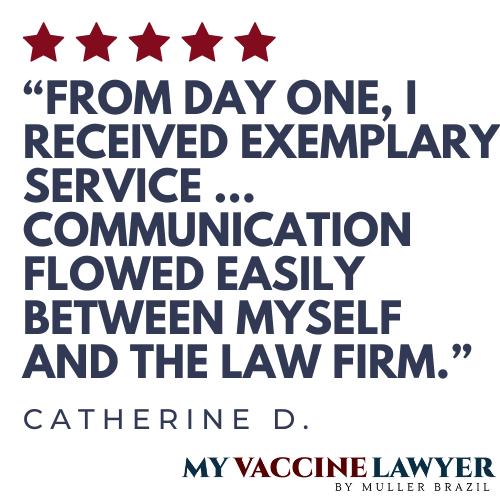- About Us
-
VICP Program
- About the VICP
-
VICP Injuries
- ADEM Injury Lawyer
- Anaphylaxis Injury Lawyer
- Autoimmune Disorder Injury Lawyer
- Bell's Palsy Injury Lawyer
- Brachial Neuritis Injury Lawyer
- CIDP Injury Lawyer
- Complex Regional Pain Syndrome Injury Lawyer
- Encephalitis Injury Lawyer
- Guillain-Barré Syndrome Injury Lawyer
- Intussusception Injury Lawyer
- ITP Injury Lawyer
- MOGAD Injury Lawyer
- SIRVA Injury Lawyer
- Transverse Myelitis/Neuromyelitis Optica Injury Lawyer
- Vasovagal Syncope Injury Lawyer
- Vaccine Injuries
- Vaccines
Understanding a SIRVA Injury
A shoulder injury due to a vaccine is known as SIRVA
The experience of a sore upper arm or shoulder pain from a vaccine is familiar. A slight tenderness at the injection site often accompanies the body's immune response to the vaccine components.
Contact Us TodayContact us today to get started.
What is SIRVA?
SIRVA stands for Shoulder Injury Related to Vaccine Administration. Sirva happens when a vaccine is given in the wrong place, causing severe shoulder pain and trouble moving the arm. Unlike side effects from the vaccine, SIRVA is caused by how the vaccine is injected, not what's in it. SIRVA makes the shoulder hurt for a long time and makes it hard to move normally. If you've had shoulder pain or trouble moving your arm after getting a vaccine, it's important to see a doctor to find out if SIRVA might be the reason and to learn about treatment options. According to the National Library of Medicine, from July 2010 to June 2017, around 996 million doses of influenza vaccine were distributed in the United States. During this period, as per the US Vaccine Adverse Event Reporting System, there were 1,220 reports of atypical shoulder pain occurring within 48 hours of vaccine administration and lasting for more than 7 days.

4,500
1,750+
5 Stars
What causes SIRVA?
SIRVA is typically caused by improper vaccine injection placement rather than the vaccine's content. A vaccine administered too high or too deep into the shoulder joint can damage the surrounding structures, leading to inflammation and pain. This improper placement affects the shoulder's mobility and can result in discomfort. Proper vaccine administration techniques are necessary for preventing SIRVA and guaranteeing patient comfort.
What are symptoms of SIRVA?
Shoulder Injury Related to Vaccine Administration (SIRVA) can present with a range of symptoms, often centered around the shoulder joint and upper arm. If you've recently received a vaccine and are experiencing any of the following symptoms, it's important to seek medical attention promptly:
- Persistent Shoulder Pain
- Left Shoulder Pain
- Limited Range of Motion
- Shoulder Joint Inflammation
- Muscle Weakness
- Rotator Cuff Tears or Tendinopathy
- Nerve Injury or Irritation
- Frozen Shoulder (Adhesive Capsulitis)

Don't worry, we're here to help.
Which vaccine lead to SIRVA?
SIRVA, or Shoulder Injury Related to Vaccine Administration, can occur when a vaccine is improperly administered, causing shoulder pain and dysfunction. While it's often linked with vaccines like influenza and HPV, any vaccine given incorrectly can lead to SIRVA.
Injection errors, such as going too deep into the shoulder or using the wrong needle size, heighten the risk. Here are some common vaccines covered by the Vaccine Injury Compensation Program (VICP):
- Influenza (Flu) Vaccine
- Human Papillomavirus (HPV) Vaccine
- Tetanus Vaccine
- Measles, Mumps, and Rubella (MMR) Vaccine
- Varicella (Chickenpox) Vaccine
- Hepatitis B Vaccine
How is SIRVA diagnosed?
Diagnosing Shoulder Injury Related to Vaccine Administration (SIRVA) involves an assessment by healthcare professionals familiar with shoulder injuries and vaccine-related adverse reactions.
Initial steps include:
- Review Medical History and Vaccination Records: The initial step involves reviewing the individual's medical history, including vaccination records, and noting when symptoms started.
- Physical Examination: A physical examination assesses the shoulder's range of motion, strength, and signs of inflammation around the injection site. This helps in identifying any abnormalities.
- Imaging Studies: Healthcare professionals may order imaging studies such as X-rays or MRI scans to evaluate structural abnormalities in the shoulder joint further.
- Differential Diagnosis: Differential diagnosis ensures that SIRVA is accurately identified among other potential causes of shoulder pain. This helps rule out other conditions that may mimic SIRVA symptoms.
- Referral and Review: Referral to specialists and a thorough review of vaccine administration techniques are common steps taken to confirm the diagnosis and identify any errors in vaccine administration.
- Establishing a Link with Vaccine Administration: It's crucial to establish a clear link between vaccine administration and the onset of symptoms. This helps confirm SIRVA as the cause of shoulder pain.
- Prompt Evaluation: Seeking prompt evaluation by a healthcare professional is necessary for an accurate diagnosis. If SIRVA is suspected, tailored treatment planning can begin to alleviate symptoms and promote recovery.
What are the treatment options with SIRVA?
Shoulder Injury Related to Vaccine Administration (SIRVA) requires prompt treatment to alleviate symptoms and restore shoulder function. Here are common treatment options for individuals diagnosed with SIRVA:
- Physical Therapy: Customized exercises and techniques to improve shoulder mobility and strength, aiding pain relief and functional recovery.
- Medication Management: Administration of medications like nonsteroidal anti-inflammatory drugs (NSAIDs) to reduce inflammation and alleviate pain associated with SIRVA.
- Rest and Activity Modification: Rest the affected shoulder and adjust daily activities to avoid exacerbating symptoms, promote healing, and prevent further injury.
- Surgical Intervention: In severe cases where conservative treatments fail, surgical procedures may be necessary to address underlying structural issues and restore shoulder function.
- Orthopedic Interventions: Procedures such as joint injections or surgical joint washout to alleviate inflammation and improve shoulder function by addressing underlying pathology.

Long-term implications of SIRVA
Understanding the long-term implications of Shoulder Injury Related to Vaccine Administration (SIRVA) is key to effective management and preventing future complications. Individuals affected by SIRVA may experience persistent symptoms and functional limitations, leading to chronic shoulder problems and impaired quality of life. Among the long-term implications of SIRVA, the risk of developing a rotator cuff tear is a significant concern. Without proper treatment and rehabilitation, upper arm injury and ongoing shoulder pain can contribute to the development of rotator cuff tears. This can further complicate shoulder issues and recovery. Early interventions to avoid shoulder injury related to vaccine administration are important for minimizing the long-term impact of SIRVA and promoting optimal shoulder health.
What are the legal considerations with SIRVA?
Shoulder Injury Related to Vaccine Administration (SIRVA) raises important legal considerations for individuals who have experienced adverse effects following vaccination. Understanding these legal aspects is important for protecting one's rights and pursuing appropriate recourse. Here are key legal considerations related to SIRVA:
Vaccine Injury Compensation Program (VICP):
In the United States, individuals who suffer from vaccine-related injuries, including SIRVA, may be eligible for compensation through the Vaccine Injury Compensation Program (VICP). VICP provides a streamlined process for filing claims and obtaining financial compensation for vaccine-related injuries, including:
- Medical expenses
- Lost wages
- Pain and suffering
Statute of Limitations:
The VICP enforces a statute of limitations for vaccine injury claims. If you have been injured, acting promptly is key. For injuries, you must file within 3 years after the first symptom or manifestation of onset or significant aggravation of the injury.
In cases of death resulting from a vaccine injury, the claim must be filed within 2 years of the death and 4 years of the first symptom or significant worsening of the injury leading to the death. Delaying beyond these timeframes may result in the forfeiture of your legal rights to seek compensation.
Proof of Injury:
Establishing a causal link between the vaccine administration and the resulting shoulder injury is essential in pursuing legal action for SIRVA. Medical documentation may be necessary to demonstrate the connection between the vaccine and the injury, including:
- Diagnosis
- Treatment records
- Expert testimony
Legal Representation:
Seeking guidance from an experienced attorney specializing in vaccine injury law is advisable for individuals considering legal action for SIRVA. A knowledgeable attorney can provide invaluable assistance in navigating the legal process, gathering evidence, and advocating for the injured party's rights.
Potential Defendants:
Depending on the circumstances surrounding the vaccine administration and injury, various parties may be held liable for SIRVA, including:
- Healthcare providers
- Vaccine manufacturers
- Vaccine administrators
Identifying the appropriate defendants and pursuing legal action against them requires careful evaluation of the facts and legal considerations.
Compensation for Damages:
Individuals who suffer from SIRVA may be entitled to compensation for various damages, including:
- Medical expenses
- Rehabilitation costs
- Lost income
- Pain and suffering
- Long-term disability
Understanding the full extent of damages and pursuing fair compensation is essential for achieving a favorable legal outcome.
Why choose My Vaccine Lawyer
Specialized Expertise: Our team is well-versed in vaccine-related complications and how to navigate a shoulder injury from a flu shot, ensuring the best possible representation.
No Fees Unless You Win: Your case is our priority. You owe nothing until we secure a successful outcome for you.
Personalized Care: Every client has a unique story, and we ensure you receive individualized attention throughout your legal journey.
Our Reputation: Our firm has successfully represented over 3,500 clients across all 50 states. Vaccine Injury is all we do. Let our vaccine injury lawyers, in-house medical team, and legal support staff do the heavy lifting.
We are here to guide you through the VICP process – and help you get the relief you deserve.

Hear Cheryl's Vaccine Injury Story
Cheryl suffered SIRVA (shoulder injury related to vaccine administration) following a flu shot. Her vaccine injury claim was filed in the VICP by vaccine lawyer Max Muller where she obtained a large cash settlement for her pain and suffering, lost wages and out of pocket medical expenses.

I reached out to My Vaccine Lawyer after confirming I suffered from SIRVA. They were so helpful, understanding and thorough throughout the process. They were quick to respond, always answered the phone and I feel they fought to get me what I was entitled to. If you suffered from an injury then please call My Vaccine Lawyer. They will take care of you!
- Melissa Heffley, SIRVA Client
Frequently Asked Questions
-
What is SIRVA (Shoulder Injury Related to Vaccine Administration)?
SIRVA refers to a shoulder injury resulting from improper vaccine administration techniques rather than the vaccine's contents. It manifests as persistent shoulder pain, limited range of motion, and inflammation around the shoulder joint.
-
What are the Common Symptoms of SIRVA?
Symptoms of SIRVA include persistent shoulder pain, limited range of motion, inflammation of the shoulder joint, weakness in the deltoid muscle, and potential complications such as rotator cuff tears.
-
How Can I Avoid Shoulder Injuries Related to Vaccine Administration?
To minimize the risk of shoulder injuries during vaccine administration, healthcare providers should ensure proper injection technique, including using the correct needle length and avoiding injection into the shoulder joint. Patients can advocate for themselves by communicating any discomfort during the vaccination process.
-
What Are the Treatment Options for SIRVA?
Treatment for SIRVA may include physical therapy to improve shoulder mobility and strength, anti-inflammatory medications to alleviate pain and inflammation, and, in severe cases, surgical intervention to repair rotator cuff tears or other structural damage.
-
Can SIRVA Lead to Long-Term Shoulder Problems?
Yes, SIRVA can result in chronic shoulder problems if not promptly diagnosed and treated. Without proper management, persistent shoulder pain and limited range of motion may lead to ongoing discomfort and functional impairment.
-
Is Legal Assistance Available for Individuals with SIRVA?
Individuals who have experienced SIRVA may be eligible for legal assistance to pursue compensation for their injuries. Legal experts specializing in vaccine injury law can help navigate the complexities of the legal process and advocate for the injured party's rights.
© 2026 Muller & Brazil LLC. All rights reserved.
